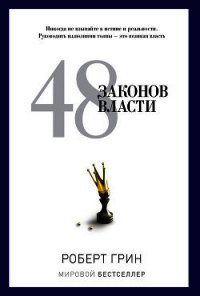Реконизм. Как информационные технологии делают репутацию сильнее власти, а открытость — безопаснее п - Петров Роман
* * *
В последние годы быстро набирают популярность сайты, предоставляющие финансовые услуги на принципах P2P — peer to peer banking или peer to peer lending. Такие финансовые системы основываются на социальных связях и репутации, а алгоритмы их работы напоминают принципы страхового рынка Lloyd’s
Источники: http://en.wikipedia.org/wiki/Peer_to_peer_banking, http://www.wiseclerk.com/group-news/
Литература
1. Marks Jonathan, What it Means to be 98% Chimpanzee: Apes, People, and their Genes. - Berkeley : University of California Press, 2002.
2. Зорина З. А., Полетаева, И., Резникова, И. И.. Основы этологии и генетики поведения. Москва : Издательство Московского университета «Высшая школа», 2002. - 2. - Web. 13 Dec. 2011. http://groh.ru/gro/zorina/zorina.html.
3. Rousseau Jean-Jacques Du Contrat Social: Ou, Principes Du Droit Politique. - Paris : Editions Garnier Frères, 1962.
4. Hobbes, Thomas. Leviathan Or The Matter Form and Power of a Common-wealth Ecclesiastical and Civil. London: Printed for Andrew Crooke , 1651.
5. Locke, John. The Second Treatise of Government. New York: Liberal Arts, 1954.
6. Morris Henry. Scientific Creationism- San Diego, CA : Creation-Life, 1974.
7. Carneiro, Robert E. Slash-and-burn Agriculture: Closer Look at Its Implications for Settlement Patterns.: S.l., 1956.
8. Diamond, Jared M. Guns, Germs and Steel: a Short History of Everybody for the Last 13,000 Years. London: Jonathan Cape, 1997
9. Маркс, Карл. К критике политической экономии, Москва, Государственное издательство политической литературы, 1949 г.
10. Чудинов, Александр Викторович. Французская революция: История и мифы. Москва. Наука. 2007.
11. Васильев, Л. С., Стучевский, И. А. «Три модели возникновения и эволюции докапиталистических обществ» Вопросы истории 5 (1966).
12. Bard, Alexander, Söderqvist, Jan. Netocracy: the New Power Elite and Life after Capitalism. London: Pearson Education, 2002.
13. Завалько, Григорий. “Понятие "революция" в философии и общественных науках: Проблемы, идеи, концепции”, Москва, Либроком, 2011
14. Schama, Simon. Patriots and Liberators: Revolution in the Netherlands, 1780-1813. New York: Knopf, 1977.
15. Coward, Barry, and Durston, Christopher. The English Revolution. London: John Murray, 2002.
16. Palmer, R. R. The World of the French Revolution. New York: Harper & Row, 1971
17. Olson, Mancur. The Logic of Collective Action: Public Goods and the Theory of Groups. Cambridge: Harvard UP, 1965.
18. Ленин, Владимир Ильич. Что делать? Москва. Политиздат. 1968.
19. Fromm, Erich. Beyond the Chains of Illusion: My Encounter with Marx and Freud. New York: Simon and Schuster, 1962
20. Gurley, Fred G. «Unalienable Rights versus Union Shop» Proceedings of the Academy of Political Science 26.1 (May, 1954): 58-70.
21. Киященко, Анна. «Изменение системы управления жилищным фондом в Полтаве для повышения качества жилищных услуг и сохранения жилого фонда» Реформа ЖКХ: пути к эффективности и социальной справедливости, сборник публикаций (Киев 2009): 16-21. Local Government and Public Service Reform Initiative. Web. 12 Dec. 2011. http://lgi.osi.hu/cimg/0/1/2/2/7/Reforma_for_pdf
22. Møller, Bjørn. Resolving the Security Dilemma in the Gulf Region. Abu Dhabi: Emirates Center for Strategic Studies and Research, 1997
23. Koers, A. W. Bowett, D.W. The Legal Regime of Islands in International Law...» Netherlands International Law Review 31.02 (1984): 283
24. Семенов, Ю. И. Секреты Клио. Сжатое введение в философию истории. Москва, 1996.
25. Andreau, Jean. Banking and Business in the Roman World. Cambridge, UK: Cambridge UP, 1999
26. Dal Lago, Enrico, Katsari, Constantina. Slave Systems: Ancient and Modern. Cambridge: Cambridge UP, 2008.
27. Bowe, John. Nobodies: Modern American Slave Labor and the Dark Side of the New Global Economy. New York: Random House, 2007.
28. Суриков, И. Е., Аристократия и демос. Политическая элита архаических и классических Афин, Учебное пособие по спецкурсу для исторических факультетов вузов, Москва, Русский Фонд Содействия Образованию и Науке, 2009
29. Blake, William O. The History of Slavery and the Slave Trade, Ancient and Modern; the Forms of Slavery That Prevailed in Ancient Nations, Particularly in Greece and Rome, the African Slave Trade and the Political History of Slavery in the United States. New York: Haskell House, 1969.
30. Цезарь, Гай Юлий, пер. Михаил Покровский «Записки о Галльской войне», Москва, Рипол Классик, 2010
31. Кастельс, Мануэль , Информационная эпоха: экономика, общество и культура Москва, ГУ ВШЭ, 2000, Web http://www.gumer.info/bibliotek_Buks/Polit/kastel/index.php 09.01.2012
32. Cordell, Antonio, and Simo, Kai A. "The Impact of Information Technology on Transaction and Coordination Cost" Viktoria Institute Götebor, IRIS20 Conference, Published in the Proceedings of the Conference. Web. 12 Dec. 2011. http://www.instant-science.net/pub/tracost.pdf.
33. Simon, H. "Theories of Decision Making in Economics and Behavioural Science" American Economic Review 49.3 (1959): 253-83.
34. Coase, R. "The New Institutional Economics" Journal of Institutional and Theoretical Economics 140 (Coase R. The New Institutional Economics // Journal of Institutional and Theoretical Economics, March 1984, V.140, P.229–231): 229-31.
35. Coase, R. H. "The Nature of the Firm" Economica 4.16 (1937).
36. Funding a Revolution: Government Support for Computing Research. Washington, D.C.: National Academy, 1999.
37. Gerovitch, S. "InterNyet: Why the Soviet Union Did Not Build a Nationwide Computer Network" History and Technology 24 (2008): 335-50
38. Norberg, Arthur L., O'Neill, Judy E., and Freedman, Kerry J. Transforming Computer Technology: Information Processing for the Pentagon, 1962-1986. Baltimore: Johns Hopkins UP, 1996
39. Abbate, Janet. Inventing the Internet. Cambridge, Mass. u.a.: MIT, 2000.
40. Bamford, James. Body of Secrets: Anatomy of the Ultra-secret National Security Agency. New York: Anchor, 2002
41. Schneider, G. "Bueno De Mesquita, Bruce (2009) The Predictioneer's Game: Using the Logic of Brazen Self-Interest To See and Shape the Future. New York: Random House. Xxii + 250 Pp. ISBN 9781400067879." Journal of Peace Research 47.4 (2010): 512-13. Print. Solove, Daniel J. The Digital Person: Technology and Privacy in the Information Age. New York: New York UP, 2004.
42. Solove, Daniel J. The Digital Person: Technology and Privacy in the Information Age. New York: New York UP, 2004.
43. Cate, Fred H. Privacy in the Information Age. Washington, D.C.: Brookings Institution, 1997
44. Federal Government Information Technology: Electronic Record Systems and Individual Privacy. Washington, D.C.: Congress of the U.S., Office of Technology Assessment, 1986.
45. Holtzman, David H. Privacy Lost: How Technology Is Endangering Your Privacy. San Francisco: Jossey-Bass, 2006.
46. Long, Edward V. The Intruders; the Invasion of Privacy by Government and Industry,. New York: Praeger, 1967.
47. Whitaker, Reginald. The End of Privacy: How Total Surveillance Is Becoming a Reality. New York: New, 1999.
48. Cohen, Julie E. "Privacy, Visibility, Transparency, and Exposure" The University of Chicago Law Review 75.1 (2008): 181-201. Web. 12 Dec. 2011. http://www.jstor.org/stable/20141904.




